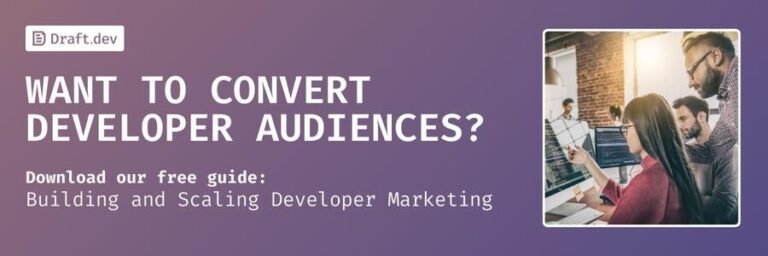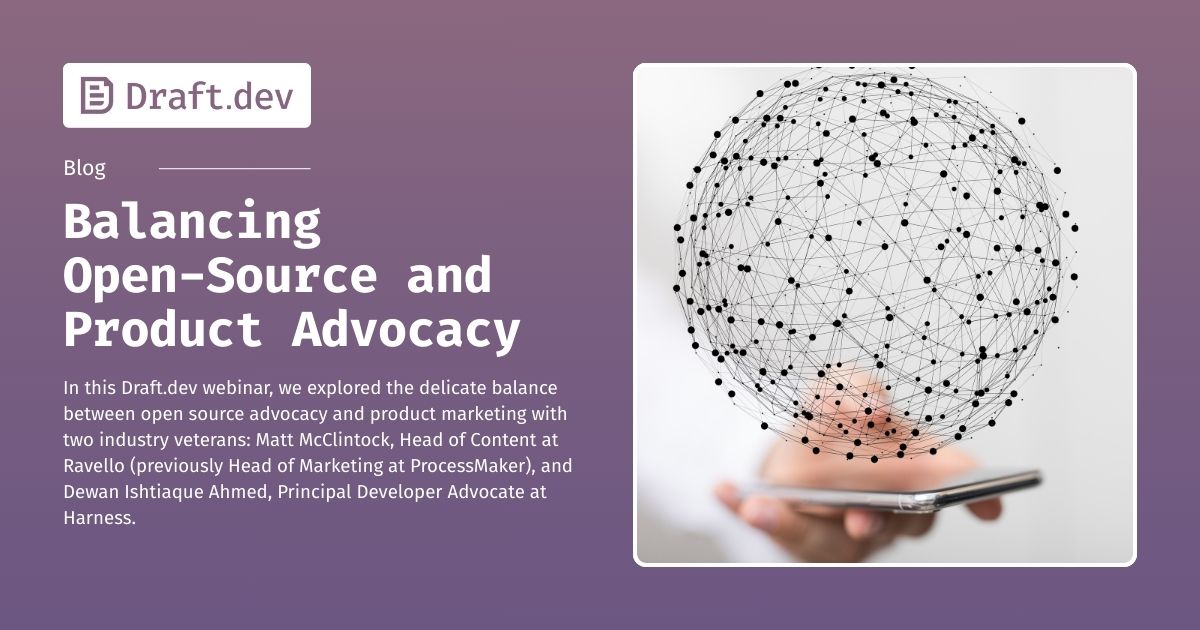In this Draft.dev webinar, we explored the delicate balance between open source advocacy and product marketing with two industry veterans: Matt McClintock, Head of Content at Revelo, and Dewan Ishtiaque Ahmed, Principal Developer Advocate at Harness.
Open-Source Advocacy Vs. Product Advocacy
When discussing open-source advocacy versus product advocacy, our experts emphasized that these approaches should complement each other rather than compete.
“The key difference here is the ownership. In open-source projects, everyone is the owner; we all have stakes in this. With product advocacy, it’s you versus me. You trying to sell me something, which is not bad, it’s just the fact.” – Dewan Ishtiaque Ahmed [04:09]
Maintaining Authenticity and Credibility
Transparency emerged as the cornerstone of successful advocacy strategies across both domains. Matt emphasized the importance of not neglecting your open-source product as your enterprise business grows:
“You shouldn’t just say, ‘Okay, we have millions of downloads on our open source project. Now we’re just gonna leave GitHub and solely focus on building out the enterprise business.’ Developers will very much not respond well to that.” – Matt McClintock [14:50]
A common pitfall that both experts warned against is removing features from the open-source version to drive enterprise adoption. Instead, they recommended evolving both offerings in parallel but in different directions.
Dewan reinforced this perspective by highlighting the importance of maintaining multiple feedback channels:
“Your mechanism of getting feedback and tracking could be different, but you don’t shut down the open source path and just focus on enterprise because they’re paying customers. Your open source community might be your customers – not yet, they might be customers later.” – Dewan Ishtiaque Ahmed [15:43]
Measuring Success and Community Health
When it comes to measuring the effectiveness of open source initiatives, our experts identified several key metrics:
- Engagement and contributions: Are community members actively participating?
- Downloads and adoption: How many people are using your open source project?
- Monthly active users/developers (MAU/MAD): The “North Star” metrics for tracking community health
- Quality feedback: Valuable input that can inform both open source and enterprise roadmaps
Matt cautioned against relying solely on vanity metrics like GitHub stars, emphasizing instead the importance of genuine engagement. He also shared a crucial insight about who should be interacting with your open source community:

“That is a common mistake or missed opportunity… Sometimes it’s marketing that’s sort of engaging with the open-source community, and it really should be your engineers.” – Matt McClintock [19:11]
Setting Realistic Expectations
While product advocacy efforts might yield immediate, trackable results, open source community building requires a longer-term perspective.
Matt recommended regularly sharing success stories with leadership about enterprise customers who started as open source users:
“A lot of our longer-term customers started off with our open-source offering… built a bunch of processes that they run their organization off of, and then got to a point where, ‘All right, we’re using this product so much, it’s so critical to our business that it would probably be a good idea to get the Enterprise version.’” – Matt McClintock [24:33]
Practical First Steps for Organizations
For companies just beginning to balance open source and product advocacy, our experts offered these practical recommendations:
- Understand your audience: Start by analyzing why your open source community grew in the first place
- Recognize developers as kingmakers: Remember that individual engineers often influence tool adoption across organizations
- Create gathering opportunities: Consider user conferences (even virtual ones) to learn from and engage with your community
- Leverage existing events: You don’t need to create your own events – participate in established meetups and conferences where your audience already gathers
“You can even engage with existing events or meetups because you all share the same audience… You can sponsor one of the DevOps days. You can have a booth. You can just have your engineers attend those events.” – Dewan Ishtiaque Ahmed [30:39]
Conclusion
The relationship between open-source advocacy and product marketing continues to evolve, but the fundamental principles remain consistent: transparency, community engagement, and authentic communication. By understanding your audience, empowering your power users, and maintaining a long-term perspective, organizations can successfully navigate this balancing act.
You can watch the entire webinar here:
Draft.dev’s webinars are a great way to learn more about similar DevRel and technical marketing topics.
